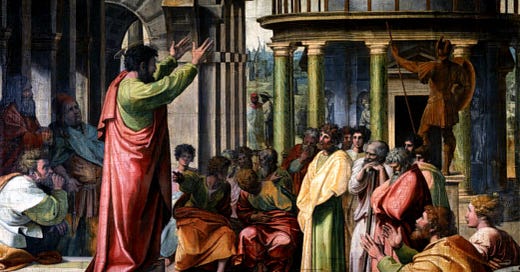In today’s readings, Paul and Jesus put the Messiah and messianic prophesies into context. Jesus didn’t come out of nowhere. The Jews had been waiting for a messiah for hundreds of years.
Reading 1
Acts 13:13-25
From Paphos, Paul and his companions set sail and arrived at Perga in Pamphylia. But John left them and returned to Jerusalem. They continued on from Perga and reached Antioch in Pisidia. On the sabbath they entered into the synagogue and took their seats. After the reading of the law and the prophets, the synagogue officials sent word to them, "My brothers, if one of you has a word of exhortation for the people, please speak."
So Paul got up, motioned with his hand, and said, "Fellow children of Israel and you others who are God-fearing, listen. The God of this people Israel chose our ancestors and exalted the people during their sojourn in the land of Egypt. With uplifted arm he led them out, and for about forty years he put up with them in the desert. When he had destroyed seven nations in the land of Canaan, he gave them their land as an inheritance at the end of about four hundred and fifty years. After these things he provided judges up to Samuel the prophet. Then they asked for a king. God gave them Saul, son of Kish, a man from the tribe of Benjamin, for forty years.
“Then he removed him and raised up David as their king; of him he testified, I have found David, son of Jesse, a man after my own heart; he will carry out my every wish. From this man's descendants God, according to his promise, has brought to Israel a savior, Jesus. John heralded his coming by proclaiming a baptism of repentance to all the people of Israel; and as John was completing his course, he would say, 'What do you suppose that I am? I am not he. Behold, one is coming after me; I am not worthy to unfasten the sandals of his feet.'"
Paul and the gang are spreading the Good News among Jews outside of Jerusalem, who missed all the exciting events of Holy Week. They may not have even heard of Jesus’ miracles throughout the Palestinian countryside.
But Paul doesn’t just tell them about Jesus; he recaps the entire history of Israel.1 Why? He’s putting Jesus in context. He’s letting the crowd at the synagogue know that Jesus didn’t just come out of nowhere, but is the culmination of a long thread of history.
Responsorial Psalm
Ps 89:2-3, 21-22, 25 and 27
R. For ever I will sing the goodness of the Lord.
The favors of the LORD I will sing forever;
through all generations my mouth shall proclaim your faithfulness.
For you have said, "My kindness is established forever";
in heaven you have confirmed your faithfulness.
R. For ever I will sing the goodness of the Lord.
"I have found David, my servant;
with my holy oil I have anointed him,
That my hand may be always with him,
and that my arm may make him strong."
R. For ever I will sing the goodness of the Lord.
"My faithfulness and my mercy shall be with him,
and through my name shall his horn be exalted.
He shall say of me, 'You are my father,
my God, the Rock, my savior.'"
R. For ever I will sing the goodness of the Lord.
God made a lot of promises in the Old Testament, the most important of which was the promise for a Messiah. Jesus is their fulfillment.
But He wasn’t exactly what they expected. Jesus was a descendant of David, who’s line continues forever. But He wasn’t a king in the Earthly sense; He didn’t come to be served, but to serve.
Alleluia
See Rv 1:5ab
R. Alleluia, alleluia.
Jesus Christ, you are the faithful witness,
the firstborn of the dead,
you have loved us and freed us from our sins by your Blood.
R. Alleluia, alleluia
The Messiah didn’t rescue Israel from their Roman rulers, but rather saved the entire world from their enslavement to sin.
Gospel
Jn 13:16-20
When Jesus had washed the disciples' feet, he said to them: "Amen, amen, I say to you, no slave is greater than his master nor any messenger greater than the one who sent him. If you understand this, blessed are you if you do it. I am not speaking of all of you. I know those whom I have chosen. But so that the Scripture might be fulfilled, The one who ate my food has raised his heel against me. From now on I am telling you before it happens, so that when it happens you may believe that I AM. Amen, amen, I say to you, whoever receives the one I send receives me, and whoever receives me receives the one who sent me."
The word “messenger” is a translation of the Greek word apostolos, which is obviously where we get “apostle” from. Jesus isn’t talking about the Apostles specifically here, but you can see how it’s a useful turn of phrase for Him.
As for the scripture passage, Jesus is quoting Psalm 41:10. He’s being much more specific than Paul, but still, He’s pointing out His place, as the Messiah, in Jewish history. Jesus routinely cites scripture, so the disciples see Him for Who He is.
Partially for the benefit of the “God-fearing,” non-Jewish believers.




